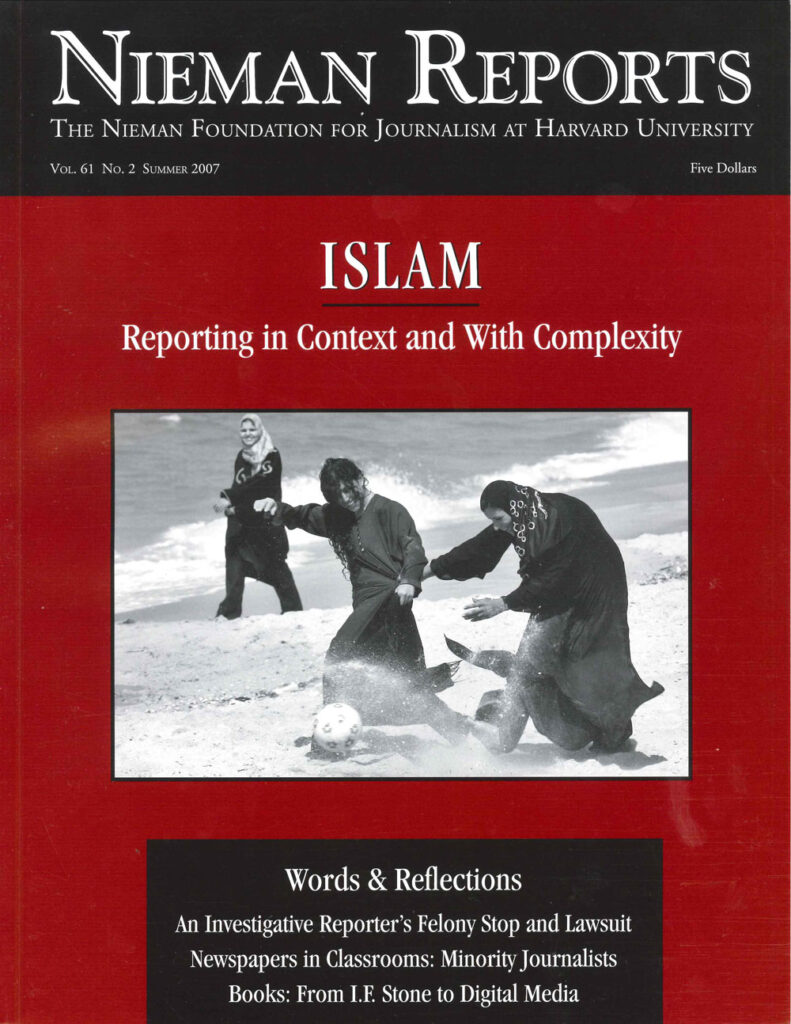On an April morning in 2005, WJLA-TV investigative reporter Andrea McCarren set out with a photographer to do some preliminary reporting about the activities of a Prince George's (Md.) County official about whom she'd received information on the misuse of public funds. By the end of the morning she'd become the first journalist in the United States known to have been put through a felony traffic stop while on assignment. She describes her interaction with the police officers as "a particularly violent encounter normally reserved for fleeing murderers or suspects known to be armed and dangerous." McCarren writes about the story she was investigating, the injuries she sustained because of police treatment, and her legal struggles to reach a just settlement.
Dan Sullivan, who teaches media management and economics at the University of Minnesota School of Journalism and Mass Communication, explores several steps that newspapers should take "to tie diversity initiatives to business results." He looks at some research about how the Newspapers in Education program works, and he shows how it can help newsrooms reach diversity goals by engaging minority students in school-based efforts that are shown to increase youngsters' interest in journalism.
Mary C. Curtis, a columnist with The Charlotte (N.C.) Observer, found in the pages of "The Race Beat: The Press, the Civil Rights Struggle, and the Awakening of a Nation," a valuable reminder for journalists today: An "honest search" for "truth amid chaos" is not a simple task, but it illuminates a story's essence in ways that the "on the one hand, on the other hand" approach never can. "The Race Beat," by Gene Roberts and Hank Klibanoff, won this year's Pulitzer Prize for History.
In "Digital Destiny: New Media and the Future of Democracy," by Jeff Chester, Cameron McWhirter, a reporter at The Atlanta Journal-Constitution, finds a book that offers a good dissection of the challenges posed by the "digital broadband revolution" as "print, radio and television—ancient divisions that were guided under separate, arcane governmental rules for so many decades—are morphing into one surging medium."
Dan Froomkin, who writes washingtonpost.com's White House Watch column, begins his reflection on Myra MacPherson's book, "All Governments Lie! The Life and Times of Rebel Journalist I.F. Stone," with the words "The best blogger ever died in 1989 at the age of 81." He is referring to I.F. Stone and his "Weekly" that was in many ways, he writes, "a blog before its time." Froomkin contends that newspapers today could learn a lot from Stone's lack of timidity "as they hunt desperately for a profitable future in the Internet age."
Through Lynn Sherr's memoir, "Outside the Box," Kay Mills, the author of "A Place in the News: From the Women's Pages to the Front Page," relives experiences of women journalists from a time when they weren't given certain assignments and their lawsuits challenged newsrooms' discriminatory ways. "Women journalists today stand on the shoulders of those gutsy women who challenged the status quo, and we should not forget this all-too-recent era in our history," Mills writes. Sherr's book, she says, "could—and probably should—double as an instruction manual for young journalists ...."
Freelance journalist Tom Ehrenfeld compliments Roy Peter Clark, the author of "Writing Tools: 50 Essential Strategies for Every Writer" for addressing "the craft of writing with a hands-on, nitty-gritty approach to improvement." In the valuable toolbox Clark offers readers, Ehrenfeld observes that each of his "50 sharp, focused 'tools' ... carries the weight of experience. They are sharp, refined and build on conventional wisdom."
Dan Sullivan, who teaches media management and economics at the University of Minnesota School of Journalism and Mass Communication, explores several steps that newspapers should take "to tie diversity initiatives to business results." He looks at some research about how the Newspapers in Education program works, and he shows how it can help newsrooms reach diversity goals by engaging minority students in school-based efforts that are shown to increase youngsters' interest in journalism.
Mary C. Curtis, a columnist with The Charlotte (N.C.) Observer, found in the pages of "The Race Beat: The Press, the Civil Rights Struggle, and the Awakening of a Nation," a valuable reminder for journalists today: An "honest search" for "truth amid chaos" is not a simple task, but it illuminates a story's essence in ways that the "on the one hand, on the other hand" approach never can. "The Race Beat," by Gene Roberts and Hank Klibanoff, won this year's Pulitzer Prize for History.
In "Digital Destiny: New Media and the Future of Democracy," by Jeff Chester, Cameron McWhirter, a reporter at The Atlanta Journal-Constitution, finds a book that offers a good dissection of the challenges posed by the "digital broadband revolution" as "print, radio and television—ancient divisions that were guided under separate, arcane governmental rules for so many decades—are morphing into one surging medium."
Dan Froomkin, who writes washingtonpost.com's White House Watch column, begins his reflection on Myra MacPherson's book, "All Governments Lie! The Life and Times of Rebel Journalist I.F. Stone," with the words "The best blogger ever died in 1989 at the age of 81." He is referring to I.F. Stone and his "Weekly" that was in many ways, he writes, "a blog before its time." Froomkin contends that newspapers today could learn a lot from Stone's lack of timidity "as they hunt desperately for a profitable future in the Internet age."
Through Lynn Sherr's memoir, "Outside the Box," Kay Mills, the author of "A Place in the News: From the Women's Pages to the Front Page," relives experiences of women journalists from a time when they weren't given certain assignments and their lawsuits challenged newsrooms' discriminatory ways. "Women journalists today stand on the shoulders of those gutsy women who challenged the status quo, and we should not forget this all-too-recent era in our history," Mills writes. Sherr's book, she says, "could—and probably should—double as an instruction manual for young journalists ...."
Freelance journalist Tom Ehrenfeld compliments Roy Peter Clark, the author of "Writing Tools: 50 Essential Strategies for Every Writer" for addressing "the craft of writing with a hands-on, nitty-gritty approach to improvement." In the valuable toolbox Clark offers readers, Ehrenfeld observes that each of his "50 sharp, focused 'tools' ... carries the weight of experience. They are sharp, refined and build on conventional wisdom."



